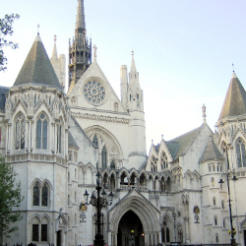The High Court has ruled that the Charity Commission will face a judicial review of its decision to pressure charities not to fund advocacy group Cage, after the group held a press conference defending a suspected terrorist.
In February the Commission asked two charities - the Joseph Rowntree Charitable Trust and the Roddick Foundation - to promise not to provide further funding to Cage, after Cage defended Mohammed Emwazi, believed to be the Islamic State executioner Jihadi John, in an hour-long press conference.
Cage said it would seek a judicial review of that decision, and its application against the Charity Commission was found arguable today on one ground at the Royal Court of Justice in London, althought it was also refused on two others.
The review will now proceed to a divisional court hearing in “early October”.
Cage claimed that the Charity Commission’s actions were made "ultra vires" - outside its powers as a regulator under the Charity Act 2011, and this ground was deemed "arguable".
Cage also argued that the Commission's actions violated Cage’s right as an advocacy group to express its freedom of association and that it was unfair of the Commission to exercise those powers (if indeed they do exist) without first seeking representation from Cage. These grounds were dismissed.
In summing up, Lord Justice Burnett said that in his opinion, that “ground one is arguable and should be heard by a divisional court”, while dismissing the other two grounds.
Justice Burnett also said that “if the Charity Commission does have the power in the [Charities] Act to do what it did,” the Commission might yet have to answer a second ground in divisional court being: “if such a power exists, was the execution of it rational?”
Burnett said that if Cage and its legal team wished for this second point to be argued in a divisional court at a later stage, “it must be properly evidenced and presented to the divisional court, if the review is to be expanded, by the middle of September”. Burnett said the review would proceed to its next stage at a divisional court by “early October”.
Alongside the legal representatives of both Cage and the Charity Commission, a barrister for the Joseph Rowntree Charitable Trust was also present as an “interested party” in the proceedings. A separate submission on costs was made by the JRCT, but this will be discussed out of court.
Cage: 'We may also sue David Cameron'
Cage originally said that it would be bringing judicial action against the sector regulator in June, when it accused the Commission of “exceeding its role” in forcing the Joseph Rowntree Charitable Trust and the Roddick Foundation to promise not to provide funding.
While JRCT has supported the review, the Roddick Foundation has not taken part.
Cage also claims that the Commission “spread false information based on misleading reports in certain sectors of the media” about its advocacy work.
In the same statement, Cage also said that it is “currently seeking legal advice on whether British Prime Minister David Cameron is guilty of defamation” over comments he made in a speech at a Birmingham school on Tuesday.
Cameron said that Cage told people to “support the Jihad” in Afghanistan and Iraq and said the National Union of Students should be “shamed” for choosing to “ally” itself with the group in the past.
Adnan Siddiqui, director of Cage said: "Cage is taking steps to challenge this strategy, as maligning us will damage efforts made by various sections of society to search for solutions to issues that affect all of society.
"We are not the problem even though our call for dialogue and conciliation may not be welcome by the government. We are looking to all fair minded people to join us in preventing alienation, division and fear with a view to preserving the basic freedoms that have been the fruits of the struggles of previous generations."
Cage also formally announced yesterday that it has "lodged an official complaint with the United Nations Special Rapporteur," calling for a full investigation of the British Government.
Commission: 'We look forward to explaining ourselves to the court'
A Charity Commission spokeswoman said: “Cage is not a charity and has never been a charity. Given the public statements made by representatives of Cage in February about Mohammed Emwazi and the public anger and concern these comments generated, we sought information and assurances from charities which had funded or been connected with Cage.
"We secured assurances that they were not funding Cage and in the current circumstances had no future intention of doing so.
"Our aim in doing so was to protect the public trust and confidence in charity and ensure the trustees of the charities concerned were complying with their legal duties towards their charity.
"We remain of the view that this was the responsible course of action for the charity regulator to take.
"We look forward to explaining to the Court why the Commission’s engagement with these charities was firmly within our powers.”









